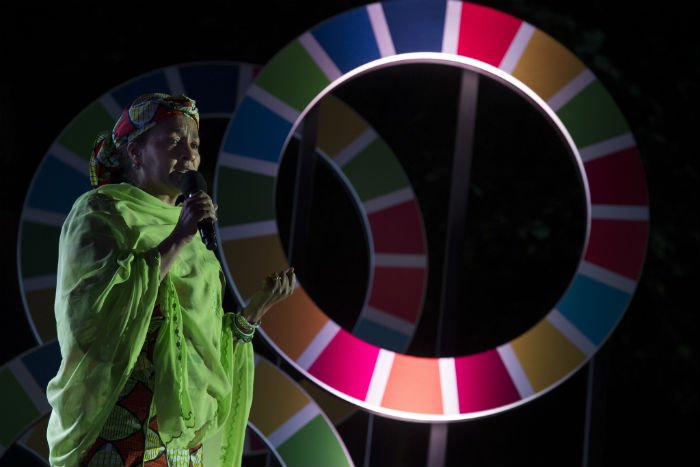Food and hunger issues affect the health and vitality of living person. Every person needs access to quality food not only sustain life but to do well at it too. But the way food is distributed today makes this a global challenge that Global Citizen needs your help to overcome.
There is enough food in the world to feed everyone but due to unsustainable and inefficient agricultural practices, food aid, and other aspects of the global food supply not everyone receives the nourishment and meals they need.
Learn More: 7 (Gross) Foods That You'll Be Eating in the Future
What’s the scope of the problem?

795 million people do not have access to enough food to survive and thrive in the world.
66 million of these people are children, and hunger prevents them from achieving their full potential in school.
Globally, that’s one out of nine people who do not get enough food to live the life they want. And the majority of the world’s hungry live in developing countries--where 12.9 percent of the population struggles with hunger. While other region of the world waste billions of tonnes of food each year.
In Sub-Saharan Africa, one out of four people are hungry.
Read More: How to Join the Food & Hunger Movement
With increasing effects of climate change leading to more drastic temperatures, growing food is harder than ever before. But there are innovative new ways to grow food in a sustainable way appearing all over the world. As long as this technology and education around growing food is shared, the world can work together to achieve Global Goal 2: Zero Hunger.
What happens when people don’t have enough to eat?

When people don’t have enough a lot happens. Children are not able to focus in school, some do not have enough energy to make the journey to school. Children cannot grow up to lead a healthy and active life, their cognitive and physical growth is limited and can result in stunted growth and even death.
Girls are also affected by lack of food. When a family cannot feed their daughter, parents facing poverty can turn to child marriage over pursuing an education for daughters. No girl or family should be faced with the decision to marry because they cannot feed themselves.
Nearly half of deaths in children under the age of five are caused by poor nutrition. When children do not receive the nutrients they need, they can become seriously ill. To learn more about the health issues facing the world’s poor and hungry population you can read our page on Health Issues.
Learn More: This Guy Spent Only $2.25 Last Year on Food
What’s being done?

Around the world, leaders, organizations and people are investing in research to create new ways to feed the growing global population. Also, investing and empowering farmers is one of the best ways to create the necessary change to create a world without hunger.
Did you know 80 percent of the world is fed by smallholder farmers? When these farmers are empowered and education with the proper technology, equipment and tools to understand the best ways to feed their communities the world can better feed it’s hungry.
This is the way food aid should function, and reform is taking place in the world of food aid. A shift to empower farmers and help communities at a grassroots level instead of sending extra food wealthier countries don’t need is happening and making a difference.
Some of the biggest staples in the world are rice, wheat, and maize. Research and innovation on these key staple foods is creating progress for farmers to be able to grow food and feed the world more efficiently.
What progress has been made?

During the 1980s, eight million people each year would become hungry. Now, hunger is decreasing in the world. In 2013, 805 million people were hungry and today ten million less people go to bed hungry. This is progress, and now that the world has the tools to end hunger we can continue this progress.
This generation has a lot of power to change the world. One of the changes today’s generation can make is ending hunger.
One of the biggest steps that has been made is acknowledging the importance of reform in food aid. It’s about empowering people and providing the tools for communities to feed themselves, not just donating wasted food. It’s a big shift but it’s one that the world can accomplish and society has been making progress toward.
What role does Global Citizen play in all this?

Global Citizen puts the issues of food and hunger in front of world leaders and tasks them to create changes in food aid distribution, and invest in research and sustainable projects for farmers around the world to alleviate hunger. We also make the voices of global citizens heard on a global scale so politicians feel the pressure and are aware where hunger is problem and what solutions communities facing hunger need access to.
Global Citizen launched our Live Below the Line campaign and raised awareness for the world’s hungry by asking EVERYONE to try living on $1.50 dollars per day. That’s how much the extreme poverty line is, and how much more than 1.3 billion people live on. Many celebrities, global citizens and world leaders learn how incredibly challenging trying to feed yourself while living at the poverty level is, and by experiencing this it can create a bigger movement for people to take action to end hunger and raise the living wage for citizens around the world.
Why are food issues important to being a Global Citizen?

Growing food can be a powerful tool for women and men to make a living, for countries to develop economies, promote gender equality and for the world to become a better place for all humanity.
Food brings humankind together. Despite differences in language, geography, ideology food, like music, is one commonality between cultures people can share and celebrate together.